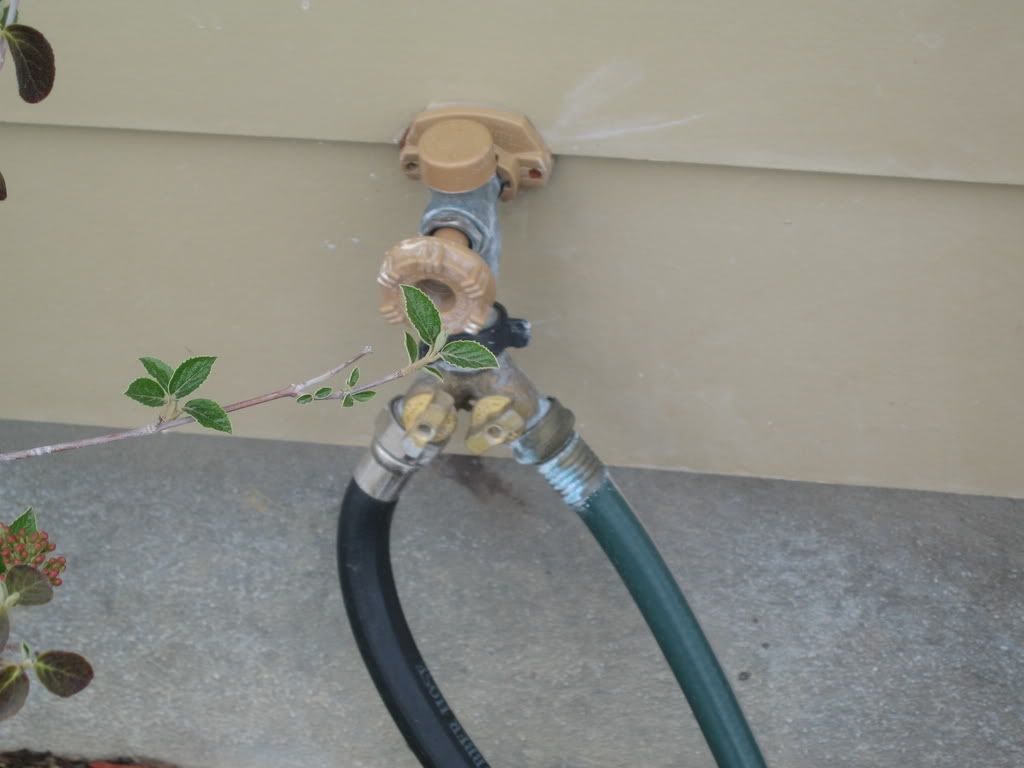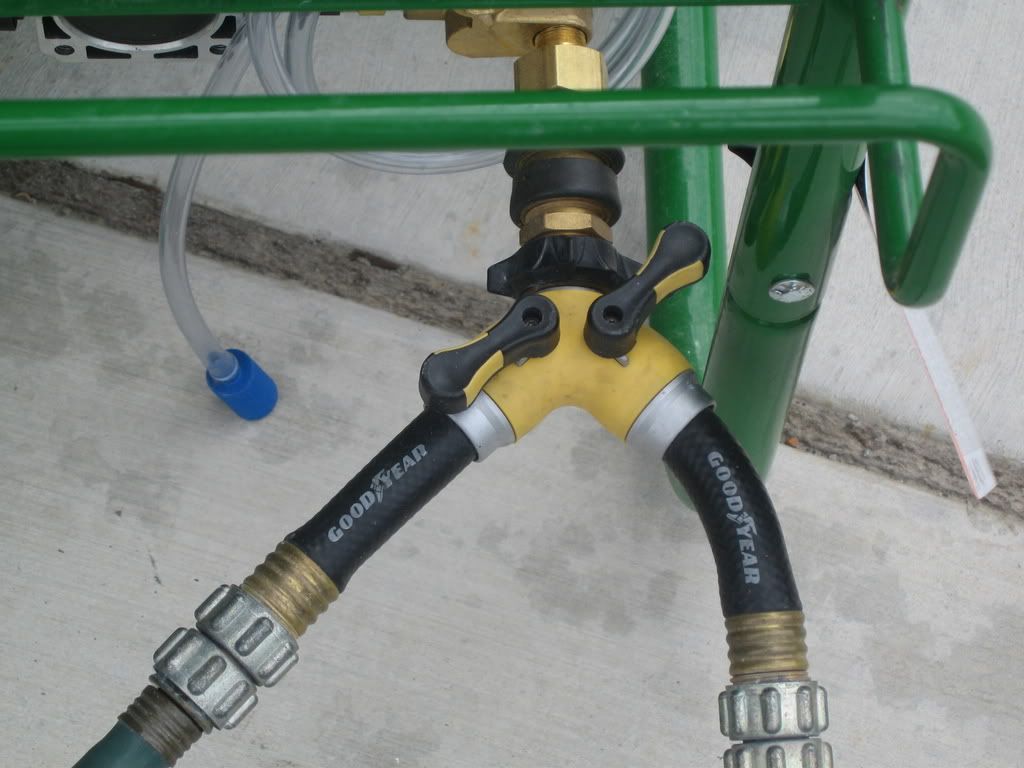There`s been alot of talk here recently about CRSpotless systems. Everyone that uses one seems to be very happy with them, however the cost of entry is very high. Here`s how I`m putting together a CRSpotless type system for.....
99 bucks!!! yup, 99 bucks for a system that should work just as well. The following is a repost, but I thought it might be worth a thread of it`s own if it helps some people save some cash...
The G104 double cartridge filter setup from this page, Garden Hose Filters
Looks like this:
Now add at least one of the FC006 Mixed Bed Deionizing filters from this page, Filter Cartridge Quick Order Chart and you have your own CRSpotless type setup for a whole bunch less cash.
The twin cartridge filter holder is 55 bucks, and the filter cartridges themselves are 27 bucks each. So for 99 bucks you have a system that should perform just darn near as good as a 389 dollar CRSpotless system. Just make sure that you get the FC006 Deionizing cartridges, and *NOT* the water softening cartridges lower on that page.
The one thing missing from this setup that is included with the CRSpotless is a Total Desolved Solids (TDS) gauge that will help you tell when to replace the cartridges. You can buy a cheap TDS gauge seperately, or I guess you could always just replace the cartridges when you start getting water spots.Edit: the filters will change color when they are depleted. Guess you don`t need a TDS after all.
Anyway, I`m going to be getting some of those FC006 cartridges soon to see if they really do work as well as I hope they will. I`ve been using the regular water softening filters and haven`t been very happy with them.
Edit: The filters came today. They look like this:
Note that the resin will change to deep blue when it`s used up. Also, the bottom of the cartridges unscrew, making it simple to replace the resin media with fresh resin instead of having to replace the entire cartridge assembly. This is really good news, as there are several places around that sell de-ionizing media in bulk. Again, this *is not* the same as water softening media that can be recharged with salt. This is the real deal; you`ll get de-ionized (total desolved solids at 0 ppm) water, not just softened water, using these filters. That`s what you want for a completely spot free wash. It`s also what the CRSpotless filters do, but the CRSpotless setups are crazy expensive.
These filters are quite small. I`m hoping that two in series will allow for a 2 gpm flow rate and still get TDS at zero. I don`t have a TDS meter to check for sure, so the paint on my car will have to show whether or not any hardness remains. Since the filters are quite small. I`m planning on using the DI water only for the final rinse through my pressure washer. This is easier than it sounds; I have two hoses hooked up to my pressure washer. One comes straight from the hose bib, the other passes through the cartridges. Each hose has a valve at the end (near the pressure washer) so choosing the water source for the PW is as easy as closing one valve and opening the other. I`ll take a picture of the two hose setup in case anyone wants to get the parts to duplicate it on their own PW.
It`s raining today. Hopefully the rain will break long enough tomorrow to get a good testing in.
More Editing: If you start from here: Environmental Protection Agency - Local Drinking Water Information
you can find out how hard your water is. Using this information, you can determine how many gallons of water these filters will effectively deionize. My water averages 13 grains per gallon (among the hardest water in the U.S.). Each of these filters has an estimated capacity of 300 grains. Since I`m using two (for 600 grains total capacity), that gives me a total capacity of about 46 gallons per set of two filters.
CRSpotless`s cheapest model DIW-10 Spot Free Wash System - Deionized Water Maker - CRSpotless.com
says that it has a 100 gallon capacity. Unfortunately, they don`t give the capacity in grains, so it`s impossible to know how many grains per gallon they base that 100 gallons on. If they use an average hardness of about 7 (which seems fair, as somewhere I read that the U.S. average is 7 grains per gallon), then that would give them a total capacity of about 700 grains. 100 grains more capacity than what my setup has. So for $299.00, you get 700 grains of capacity with the CRSpotless system, or for $100, you get 600 grains of capacity with my system. I`m not a math wizard, but my setup sure looks to be a better deal. Hopefully someone with a CRSpotless can chime in with the actual capacity of their system *in grains* and not gallons.
Edit 4/30/08: I`m very happy to report that it works! And it works very well. Zero water spots after allowing my car to air dry. After washing and rinsing using normal hose water, I gave the car a thorough rinse using the DI filters through the PW and left it completely wet. I allowed it to air dry. No leaf blower, no WW, nothing. Just air. I thought for sure that there would at least be a few water spots behind, but there were none. Even the glass was completely spot free. I`m very pleased with my cheap-o CRSpotless replacement.
In case anyone is interested in being able to supply their pressure washer with two sources of water, here`s some pics of my setup:
Here`s the hose bib with a splitter so you can attach two hoses. Each hose has it`s own shutoff valve.
Here`s the PW with the two hoses coming in. The green hose passes through the DI filters, and the black comes straight from the hose bib. In the picture, the current water source for the PW is the DI filtered water. I bought the parts necessary to do this from Home Depot and Sears. Sears has some decent quality brass quick connects that include built in shut off valves. They are much better quality than the ones from Home Depot. Home Depot carries the two-into-one hose arrangement that goes on to the pressure washer.
Final thoughts: I did decrease the pressure output of the PW for the final spot free rinse to make sure I wasn`t flowing the water too fast through the filters, which would allow some mineral content to slide through. The pressure loss over the two filters wasn`t very much, though. I`d guess I still had about 75% of the flow I have without the filters.
There are also some other ways to put together your own CRSpotless wannabe system that look to be even better than my arrangement. When I get more time, I`ll post the parts, links, and prices to put it together. It`ll flow 3 gpm, and have 1900 grains of capacity for a bit more money than my arrangement, but still substantially cheaper than CRSpotless`s bottom end offering. 3 GPM is more than enough for the vast majority of PW`s to run at full tilt. My John Deere unit says 2.4 gpm minimum input, and it`s a big PW.
Edit: Actually, if you did buy one of these drums RD-1 $195.00 - CRSpotless.com and the filter housings and cartridges from my first post, the cost per gallon would go down to the CRSpotless level, and the cost for the housings and cartridges would be alot cheaper.
So 99 bucks for the two-filter housing and two cartridges from my first post. then 195 bucks for the drum of resin. That would give you 1210 total gallons capacity for $294 total. Now that`s not too bad of a deal.
Results 166 to 180 of 241
Threaded View
-
04-14-2008, 10:40 AM #1
Thread Information
Users Browsing this Thread
There are currently 1 users browsing this thread. (0 members and 1 guests)
Similar Threads
-
For Sale: CRSpotless DIC-20
By eyezack87 in forum Southwest USAReplies: 0Last Post: 05-02-2010, 06:45 PM -
CRSpotless - should I do it?
By snowskate in forum Car DetailingReplies: 3Last Post: 06-17-2009, 11:49 AM -
CRSpotless - resin replacement time?
By docrice in forum Car Detailing Product DiscussionReplies: 10Last Post: 09-12-2008, 11:56 PM -
just ordered the crspotless today
By jet_m3 in forum Car Detailing Product DiscussionReplies: 7Last Post: 05-17-2005, 10:04 PM










 Reply With Quote
Reply With Quote
Bookmarks